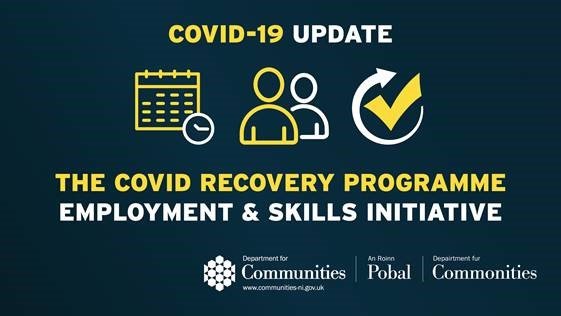Art Work - Covid Recovery - Employment and Skills Initiative for the Arts Sector
The objective of the Covid Recovery - Employment and Skills Initiative is to provide support for individuals to enter into the Arts, Creative Industries, Sport, Heritage, Voluntary and Community sectors in Northern Ireland where job roles have been impacted by the pandemic, to enhance their job prospects and skill sets, and in doing so strengthen the organisations and sectors.
The Executive and the Minister for Communities, Deirdre Hargey MLA, have provided this COVID recovery funding for arts organisations and a range of other not-for-profit organisations. The funding aims to deliver interventions to address labour market barriers faced by individuals in light of the impact of the pandemic on the economy. The interventions are to have a particular focus on the arts, creative industries, heritage, sport and voluntary community sectors.
The Department for Communities has appointed Future Screens NI (FSNI) in partnership with Arts Council NI to deliver this programme to organisations specifically within the arts sector.
Purpose:
The purpose of this programme is to create employment opportunities for individuals to work in a recognised arts organisation, which will in turn support organisational and sectoral growth. The programme will achieve this by offering organisations financial support to create fully-funded fixed-term work opportunities aligned to career paths for people from across all age ranges and backgrounds, and with a range of appropriate abilities in the arts/creative industries.
Who is the Scheme Aimed At?
• any small to medium-sized not-for-profit arts organisation
• organisations which can provide employment and skills development for an individual who wishes to enter into, or progress within, the arts sector
• organisations that can show how involvement in the scheme will support and strengthen the arts sector as a whole
• organisations based in Northern Ireland
Available Funding
A grant to fund the salary and associated costs of a new entry level position for 3 years. This is calculated on the Real Living Wage plus on-costs and includes an anticipated % increase year on year.
An additional and optional grant of up to £3,000 to fund skills and development needs of the newly appointed staff and, where appropriate, mentoring and support of existing staff within the organisation. This should add real value to the individuals involved, to the organisation and to the sector.
Management and Governance:
The Programme will be managed and administered through FSNI.
FSNI and the Arts Council (the Partners) will both be represented on the board of Art Work and will provide the oversight of the Programme. The Partners will introduce a third stakeholder to the board responsible for ensuring that the social inclusion focus of the Programme is not diluted over time.
FSNI will be used exclusively for the purposes of the Programme ensuring that the finances of the Programme are wholly transparent and that the Programme cannot be distorted or ‘mainstreamed’ into other activity undertaken by the Partners.
A key role for FSNI will be to monitor the progress of the scheme within the organisations selected to ensure agreed targets and outcomes are being reached.
FSNI will be operational for the duration of the scheme, as will the FSNI associated Future Foundation programme, which can offer mentoring to those making application to, or already supported through, the Art Work fund.
Application process:
Interested arts organisations will apply to FSNI/Art Work to have an employee appointed under the following criteria:
Applicant organisations must:
· be not-for-profit organisations, constituted, with two unrelated people able to sign on behalf of the organisation;
· organisation’s primary purpose must relate to arts;
· demonstrate that the new post created would provide a good quality job opportunity (providing transferable skills, contributing to future employability, enhancing the sector); and
· demonstrate a credible plan to prevent the need for further public sector funding for the new post after 2025 such as absorbing the post into the organisation.
Applicant organisations will be required to:
· show how the role will improve the individual’s future employment opportunities (by providing on the job training);
· have a credible proposal outlining the support and management of the new employee;
· have the ability to ensure the new post holder will be supervised by another member of staff to facilitate learning and development;
· have a strategy for planning for at least the next 3 years;
· set out how they will endeavour to employ someone who would not otherwise have the opportunity to enter employment in this sector; and
· indicate how the employment will add value for the sector.
· encourage new talent to enter employment in sectors where talent has been depleted and/or there is an ageing workforce.
· allow individuals to fulfil their potential and add value to their organisation and sector, by training in sector-specific skills.
A broad range of roles across the arts sector can be supported by this programme. Applicants are asked to demonstrate that the new posts would provide a good quality job opportunity for individuals which will in turn support organisational and sectoral growth. Roles could include, but are not limited to posts, in marketing, digital skills, operations, finance, sales, technical support, administrative support and audience engagement.
Key dates
· Open for applications between February and noon on 25 February 2022
· Decisions will be announced by 31 March 2022
· We will fund activity between 1 April 2022 to 30 June 2025
· Completion reports must be submitted by 30 September 2025
A WEBINAR TO ADDRESS QUERIES AND OFFER ADVICE WILL BE HELD ON FEBRUARY 3, DETAILS TO FOLLOW - APPLICATION FORMS WILL BE AVAILABLE AFTER THIS WEBINAR
To Register for the Webinar follow the link here.





